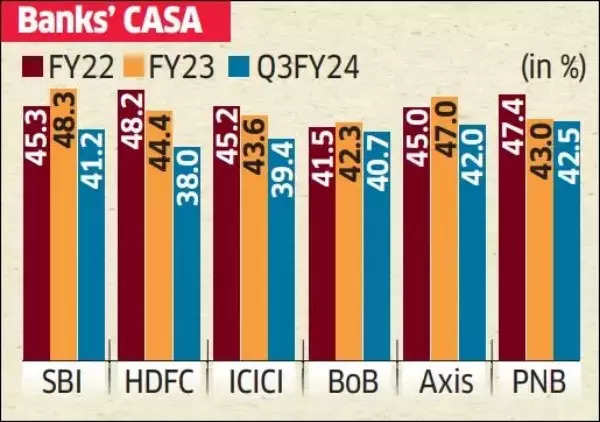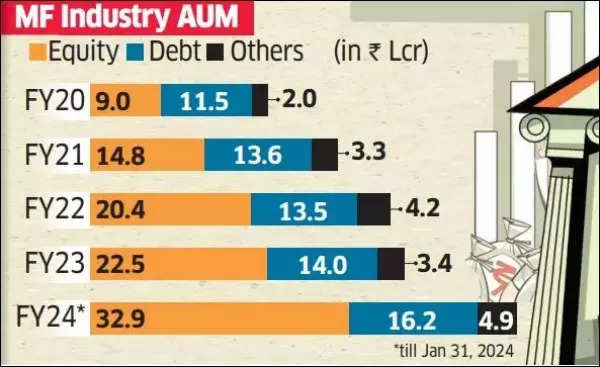Are bank deposits losing their shine? Why more savers are moving towards higher yielding investment options like mutual funds, stocks. india business news
The rise of technology and increasing familiarity with Dalal Street (Indian stock market) among rural savers is further intensifying the tussle for deposits in the banking industry. This democratization of technology is harming the dynamics of traditionally financial savings. High-Street Bank.
By September 2023, the collective casa ratio The share (current and savings account deposits) of all commercial banks in India is 40.5%, which was 43.1% in March 2023 and 45.2% in March 2022. This is a decline of about 5 percentage points in 18 months, ET reports. ,

CASA of banks
One reason for the decline in CASA ratio could be the increase in bank fixed deposit rates. State Bank of India’s CASA ratio fell to 41.18% as of December 31, 2023, a decline of 330 basis points from the previous year.
Bank of India Executive Director PR Rajagopal highlighted the change in savings patterns, especially in urban areas. Digitization has given savers access to alternative savings products such as mutual funds, reducing their dependence on banks for deposits.
The latest data from the Association of Mutual Funds in India (AMFI) shows an increase in inflows into equity mutual funds. In January, investment reached a 22-month high of Rs 21,781 crore, the 35th consecutive month of net inflows. Additionally, assets under management in the pooled fund industry increased to Rs 52.74 lakh crore.

MF Industry AUM
Furthermore, the total number of SIP accounts, which enable savers to systematically allocate their excess money to mutual funds, increased to 79.20 million in January 2024, with the addition of 5.18 million new SIP accounts during the month. .
The decline in CASA is more pronounced in private sector banks, as their younger customer base is more comfortable with technology and wants higher returns. The share of CASA deposits in private sector banks declined to 39.9% by the end of December 31, 2023, compared to 44.5% a year ago.
State Bank of India (SBI) Chairman Dinesh Khara admitted that as people are resuming their spending habits, the CASA ratio of banks is returning to pre-Covid levels. He also said that savers allocate their money to higher yielding assets during periods of inflation. However, Khara stressed that banking remains the primary channel through which money flows into mutual funds, life insurance and pension funds, thereby providing profits to banks.
The credit-deposit ratio of Indian banks reached a two-decade high of 80% in December 2023. While credit growth exceeds the nominal pace of GDP growth, deposits are growing only in line with nominal GDP. This shift of savings towards other asset classes like mutual funds, equity investments and real estate is leading to a decline in loan-to-deposit ratio (LDR) levels, a recent S&P Global Ratings report said.
Public sector banks are also facing challenges as they no longer receive large floating deposits from corporate and government accounts. Current account deposits are no longer burdensome, as companies actively manage their coffers and keep less money in their accounts. Additionally, the government now provides budgetary allocations to ministries on demand rather than in advance. Bank of India’s Rajagopal believes that these structural changes make it more challenging for banks to collect deposits.
Additionally, the popularity of sweep deposits offered by some private banks is leading to transfer of funds from salary accounts. Sweep deposits offer easy liquidity terms and attract significant amounts of funds.
Madan Sabnavis, Chief Economist of Bank of Baroda, said that the concept of sweep deposits is more prevalent in private banks. Customers of public sector and private sector banks can also transfer their funds to mutual funds.





